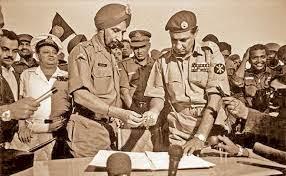On the morning of December 3, 1971, the Pakistani army began its final offensive against India. The aim was to capture the Indian-held territory of Kashmir and thus avenge the defeat of Pakistan in the 1965 war. The offensive was launched from three directions - the Chamb sector in the west, the Tithwal sector in the north, and the Uri sector in the east.
The Indo-Pakistani War of 1971 was a watershed moment in the history of the subcontinent. The conflict resulted in the largest military surrender since World War II and led to the largest forced migration in world history. The war also resulted in the birth of Bangladesh.
The Chamb offensive was repulsed by the Indian army within a few hours. The Tithwal sector saw some success for the Pakistani army but they were eventually pushed back by the Indians. The Uri sector was the most successful for the Pakistani army and they managed to capture some Indian-held territory.
However, the Indian army quickly regained the initiative and by December 16, they had surrounded the Pakistani army in East Pakistan. On December 16, the Indian army launched a massive offensive which led to the surrender of the Pakistani army and the independence of Bangladesh.
The question that arises is - should the Indian army have captured the Pakistani-held territory of Kashmir during the 1971 war?
There are a few reasons why the Indian army did not capture the Pakistani-held territory of Kashmir during the 1971 war.

- Firstly, the Indian army was not in a position to do so. The Pakistani army was much stronger than the Indian army and was better equipped.
- Secondly, the Indian government did not want to further escalate the conflict and risk a full-fledged war with Pakistan. The Indian army had already achieved its objective of liberating Bangladesh and did not want to risk another war.
- Thirdly, the Indian government was worried about the reaction of the international community if the Indian army captured the Pakistani-held territory of Kashmir. The international community would have condemned India for taking aggressive action against Pakistan.
- Fourthly, capturing the Pakistani-held territory of Kashmir would have created a new problem - what to do with the Kashmiri people? The Indian government did not want to be responsible for the Kashmiri people and did not want to get involved in the internal affairs of another country.
- Fifthly, the Indian army was not sure about the reaction of the Pakistani army if the Indian army captured the Pakistani-held territory of Kashmir. The Pakistani army could have retaliated by attacking India's oilfields in the east or by launching a nuclear attack on India.
Thus, the Indian army did not capture the Pakistani-held territory of Kashmir during the 1971 war. The question of whether India should have captured Pakistan-occupied Kashmir (PoK) during the 1971 war is a complicated one. On the one hand, it would have been a decisive victory for India and would have likely prevented future conflict in the region. On the other hand, it would have been a deeply controversial move and would have entailed a significant military commitment.
Ultimately, the decision of whether or not to capture PoK during the 1971 war was a political one, and it is impossible to say definitively whether or not it was the right decision. However, it is clear that the war had a profound impact on the region, and that its consequences are still being felt today.